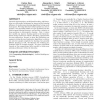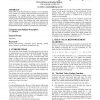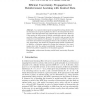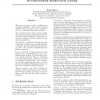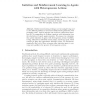ATAL
2006
Springer
13 years 8 months ago
2006
Springer
Coordinating agents in a complex environment is a hard problem, but it can become even harder when certain characteristics of the tasks, like the required number of agents, are un...
ATAL
2006
Springer
13 years 8 months ago
2006
Springer
Factored representations, model-based learning, and hierarchies are well-studied techniques for improving the learning efficiency of reinforcement-learning algorithms in large-sca...
ATAL
2006
Springer
13 years 8 months ago
2006
Springer
RVRL (Rule Value Reinforcement Learning) is a new algorithm which extends an existing learning framework that models the environment of a situated agent using a probabilistic rule...
ICANN
2009
Springer
13 years 8 months ago
2009
Springer
In a typical reinforcement learning (RL) setting details of the environment are not given explicitly but have to be estimated from observations. Most RL approaches only optimize th...
ICML
1996
IEEE
13 years 9 months ago
1996
IEEE
This paper presents a direct reinforcement learning algorithm, called Finite-Element Reinforcement Learning, in the continuous case, i.e. continuous state-space and time. The eval...
ICML
1998
IEEE
13 years 9 months ago
1998
IEEE
We present and solve a real-world problem of learning to drive a bicycle. We solve the problem by online reinforcement learning using the Sarsa( )-algorithm. Then we solve the ...
IWANN
1999
Springer
13 years 9 months ago
1999
Springer
To avoid the curse of dimensionality, function approximators are used in reinforcement learning to learn value functions for individual states. In order to make better use of comp...
IEAAIE
2001
Springer
13 years 9 months ago
2001
Springer
In this paper a combined use of reinforcement learning and simulated annealing is treated. Most of the simulated annealing methods suggest using heuristic temperature bounds as the...
AI
2001
Springer
13 years 9 months ago
2001
Springer
Reinforcement learning techniques are increasingly being used to solve di cult problems in control and combinatorial optimization with promising results. Implicit imitation can acc...
GECCO
2003
Springer
13 years 10 months ago
2003
Springer
Abstract. This paper proposes an algorithm for combinatorial optimizations that uses reinforcement learning and estimation of joint probability distribution of promising solutions ...

